
Samba (Indo-Pak Border), May 17: Even after five days of silence along the International Border, residents of border villages remain on edge—many still spending their nights in underground bunkers.
For Parduman Kumar and his family in Samba, this has become a nightly ritual. As darkness falls, they retreat into a bunker within their home's premises, driven by a deep mistrust of Pakistan's intentions.
Parduman is not alone. Across villages in Arnia, RS Pura, Ramgarh, Samba, and Kathua, families continue to live with the fear that the ceasefire, declared just a week ago by the DGMOs of India and Pakistan, might be temporary. While most residents have returned to their homes, the trauma of recent hostilities keeps them vigilant.
In Arnia, 60-year-old farmer Ravinder Singh shares his unease: “This silence is strange. We welcome the ceasefire, but we can’t ignore the past. One flare-up and it could all start again.” His home, like many others near the border, has a concrete bunker built during years of cross-border firing. Each night, his family of six takes shelter there, blankets and water in hand, prepared for the worst.
Similar fears echo in RS Pura, where Parveen Sharma, a 28-year-old shopkeeper, says, “We came back because this is our land, our home. But the bunker is now a part of our life. We can’t sleep peacefully without being ready to rush in.” Her family’s bunker, though small and cluttered, has become their refuge after sunset. Children in the area are showing signs of anxiety—restless sleep, sudden fear, and constant unease.
In Ramgarh, shopkeeper Sanjeev Kumar highlights another challenge—livelihood. “We’re trying to return to normal, reopening shops and working the fields. But how normal is it to sleep in a bunker every night? Peace feels distant,” he laments. While many bunkers were built under government schemes, some families with limited means have had to rely on improvised structures that offer little real protection.
For thousands living in these sensitive zones, the ceasefire has brought a fragile sense of relief—but not peace. Their nights in bunkers are a powerful testament to the lingering fear and uncertainty that persist despite official declarations of calm.
Until trust is rebuilt and normalcy truly returns, for the people of Arnia, RS Pura, Ramgarh, Samba, and Kathua, the bunker remains not just a shelter, but a symbol of survival in a fragile peace.
|
